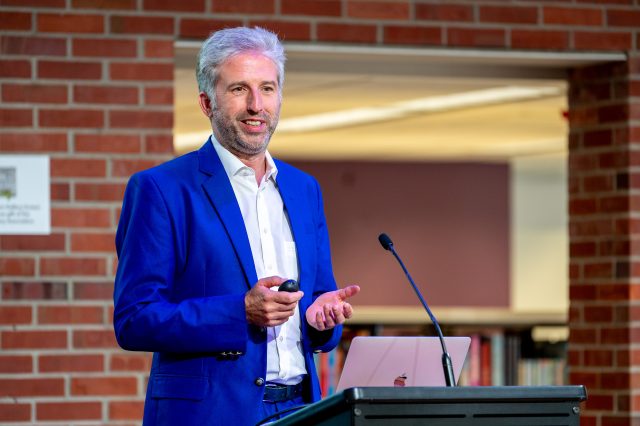[ad_1]
More than 100 Ann Arbor residents and visitors gathered in the downtown district library Wednesday night to hear from the mayor of Ann Arbor’s sister city, Tübingen, Germany. In his first visit to Ann Arbor since 2008, Lord Mayor Boris Palmer broke down Tübingen’s efforts to become carbon neutral by 2030.
The event began with an introduction from Missy Stults, city of Ann Arbor Sustainability and Innovations director. Stults said the insights from Tübingen’s sustainability efforts would help inform Ann Arbor’s own carbon neutrality goals.
“We look within ourselves, within our community and we certainly look to our sister cities to find inspiration as we move forward with those audacious goals,” Stults said.
Palmer explained that, as a sister city, Tübingen shares many characteristics with Ann Arbor: it is home to the University of Tübingen, and the university and its hospital are Tübingen’s largest employers.
The city of Tübingen’s sustainability plan has the ultimate goal of climate neutrality by 2030, which Palmer compared to Ann Arbor’s own A2Zero plan.
Palmer said one sustainable change that Tübingen adopted after his first visit to Ann Arbor 16 years ago is the use of LED street lights. He added that the city has found methods to make the street lights more efficient, like brightness levels that adjust automatically.
“That really reduces the power consumption from LEDs by about 80%,” Palmer said. “We’re hoping to replace all our LED street lights by year 2030 with that technology.”
Palmer also compared the use of public transportation in Ann Arbor and Tübingen, outlining the city’s initiatives to encourage public transportation use. These include reducing the price of tickets, allowing free use of transportation on Saturdays and giving discounts to students and low-income households. Tübingen also hopes to transition to an all-electric fleet in the future, according to Palmer. To fund this, the city plans to expand the areas with parking fees.
“That creates a lot of revenue that we can use to improve public transport systems and to lower the prices of public transport fees,” Palmer said.
Toward the end of his presentation, Palmer introduced the idea of a single-use packaging tax. Tübingen levies a tax of about $0.50 on disposable packaging and tableware and $0.20 on disposable cutlery. McDonald’s sued the city over the tax in 2021.
The proposition received mixed responses from the audience, but University of Tübingen student Frances Stoutenburgh, who attended the event, said residents have largely embraced the policy. Stoutenburgh is currently participating in an exchange program at the University of Michigan. She explained that, due to the tax, it is common for cafes and restaurants to provide reusable containers, which customers can return.
“For all the kids, it’s a very natural part of their life, growing up in Germany,” Stoutenburgh said.
Tübingen is also working to improve cycling infrastructure. The city has placed a unique emphasis on bicycle travel and constructed Germany’s first bicycle roundabout. Palmer noted that Ann Arbor Mayor Christopher Taylor has expressed interest in Tübingen’s bicycle culture , who began commuting to work via e-bike after his visit there in July 2023. Ann Arbor’s A2Zero plan aims to reduce vehicle traffic by 50% by 2030.
At the end of the event, Palmer took questions from audience members about working toward climate neutrality. One audience member asked what motivates his community to make sustainable changes, given the cost they can impose. Palmer gave the example of flooding in Germany to demonstrate that major costs can be avoided if preventive steps are taken, particularly as they relate to climate change.
“In the long run, it will be more expensive not to do anything about it,” Palmer said. “We see flooding in Germany at this time of the year … and the damage is becoming more expensive from year to year. So people see that, and I do think that many of them believe that it’s kind of reasonable to prevent that kind of damage if possible.”
Daily Staff Reporter Amanda Venclovaite-Pirani can be reached at amandavp@umich.edu.
Related articles
[ad_2]
Source link











